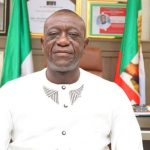Two Years of President Bola Ahmed Tinubu: Navigating Progress Amidst Challenges
By Dr. Aiyeku Olufemi Samuel Co-Founder & Lead Consultant Global Human Capital & Energy Management Limited
Governance Analyst|
Development Economist|
Policy Consultant| Strategic Development Advocate| Climate Action Enthusiast | Sustainability & Impact Investing Specialist|Girl-child Advocacy | PPP & CRM Specialist |Sales Innovation & Transformational Results-Driven Business Analyst
As Nigeria marks the second anniversary of President Bola Ahmed Tinubu’s administration, it’s essential to evaluate the strides made and the hurdles encountered. The past two years have been characterized by significant reforms aimed at revitalizing the economy, enhancing infrastructure, and improving social welfare. However, these efforts have also brought to light persistent challenges that require strategic attention.
Economic Reforms and Growth
* Nigeria’s Gross Domestic Product (GDP) experienced a notable growth of 3.84% in the fourth quarter of 2024, the highest in three years, signalling a positive trajectory in economic recovery.
* The country’s net foreign exchange reserves surged to $23.11 billion by the end of 2024, up from $3.99 billion in 2023, reflecting increased investor confidence and effective monetary policies.
* A balance of payments surplus of $6.83 billion was recorded in 2024, marking a significant turnaround from previous deficits and indicating improved economic stability.
Infrastructure Development
* The administration has initiated over 440 road projects, including the ambitious 750km Lagos-Calabar Coastal Highway, aimed at enhancing connectivity and boosting trade across regions.
* Efforts to rehabilitate and maintain 6,500 km of rural roads are underway, expected to benefit approximately 4 million rural residents by improving access to markets and services.
Social Welfare Initiatives
* The Presidential Loan and Grant Scheme has supported over 900,000 entrepreneurs and small businesses, fostering economic empowerment at the grassroots level.
* The Student Loan Scheme, launched in May 2024, has disbursed N56.85 billion to cover tuition fees and provide upkeep allowances, enhancing access to higher education for many Nigerians.
* The national minimum wage was increased to ₦70,000 per month in July 2024, aiming to improve the living standards of workers amidst rising inflation.
Security and Governance
* Security forces have reportedly eliminated over 13,500 terrorists, reflecting ongoing efforts to combat insurgency and restore peace in affected regions.
* The establishment of five new Regional Development Commissions aims to address regional disparities and promote inclusive development.
Challenges and Recommendations
Despite these achievements, several challenges persist:
* Inflation and Cost of Living: The removal of fuel subsidies and currency devaluation have led to increased living costs, affecting the purchasing power of citizens.
* Unemployment: Youth unemployment remains high, necessitating targeted job creation programs and skills development initiatives.
* Healthcare and Education: Public health and education sectors require substantial investment to improve infrastructure and service delivery.
To address these issues, the following recommendations are proposed:
* Economic Diversification: Invest in non-oil sectors such as agriculture, technology, and manufacturing to create employment opportunities and reduce dependency on oil revenues.
* Social Safety Nets: Expand social welfare programs to cushion vulnerable populations against economic shocks.
* Infrastructure Investment: Prioritize the completion of ongoing infrastructure projects to stimulate economic activities and improve service delivery.
* Good Governance: Enhance transparency and accountability in public service to build trust and ensure efficient utilization of resources.
“The future belongs to those who prepare for it today.”
– Malcolm X
Conclusion
President Tinubu’s administration has embarked on transformative initiatives aimed at repositioning Nigeria on the path of sustainable development. While notable progress has been made, addressing the lingering challenges is crucial to achieving the desired outcomes. As the administration enters its third year, a concerted effort towards inclusive growth, social equity, and good governance will be pivotal in actualizing the vision of a prosperous Nigeria.










